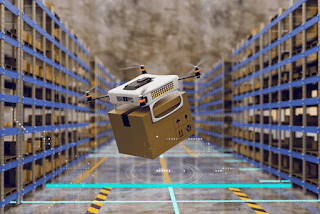Revolutionizing Logistics: Exploring Cutting-Edge Technologies Shaping the Industry
In recent years, the rapid advancement of technology has sparked a revolution in logistics, ushering in a new era of transformative solutions. From autonomous vehicles and drones to blockchain and artificial intelligence, let's delve into the trending technologies that are reshaping the logistics industry.
1. Autonomous Vehicles: Autonomous vehicles are revolutionizing the transportation sector, offering increased efficiency and reduced costs. Self-driving trucks equipped with advanced sensors and artificial intelligence can optimize routes, improving fuel efficiency, and minimizing driver fatigue. With the potential to enhance last-mile delivery and long-haul logistics, autonomous vehicles are poised to reshape the industry by increasing productivity and streamlining operations.
2. Drones: Drones have emerged as game-changers in logistics, particularly in the realm of last-mile delivery. These unmanned aerial vehicles are capable of swiftly transporting small packages to remote or congested areas, bypassing traditional transportation hurdles.
3. Blockchain: Blockchain technology, known for its decentralized and transparent nature, has immense potential in revolutionizing supply chain management. By providing an immutable and auditable record of transactions, blockchain ensures transparency, traceability, and security across the logistics ecosystem.
4. Internet of Things (IoT): IoT sensors embedded in vehicles, warehouses, and inventory can collect and transmit real-time data, enabling logistics companies to monitor and optimize every aspect of the supply chain. From tracking inventory levels and monitoring vehicle conditions to predicting maintenance needs, IoT empowers logistics providers with unprecedented visibility and control.
5. Artificial Intelligence (AI): Artificial Intelligence is driving transformation across the logistics industry, offering predictive analytics, demand forecasting, and route optimization capabilities. Machine learning algorithms can analyze vast amounts of data, identifying patterns, optimizing routes, and predicting demand fluctuations.
6. Robotics and Automation: Automation technologies, such as robotic process automation (RPA) and robotic arms, are streamlining warehousing and order fulfillment processes. Robots can perform repetitive tasks with precision and speed, improving operational efficiency and reducing errors. Additionally, automated sorting and picking systems are expediting order processing, reducing human intervention, and enhancing overall productivity.
By harnessing the power of these transformative technologies, the logistics industry can unlock unprecedented growth opportunities and deliver goods with unprecedented speed and accuracy.






Comments
Post a Comment